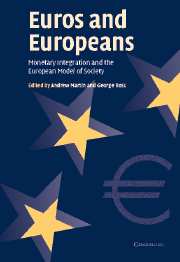Book contents
- Frontmatter
- Contents
- Preface
- List of contributors
- 1 Introduction: EMU and the European social model
- 2 The EMU macroeconomic policy regime and the European social model
- 3 Shaping a polity in an economic and monetary union: the EU in comparative perspective
- 4 Monetary integration and the French model
- 5 EMU and German welfare capitalism
- 6 Maastricht to modernization: EMU and the Italian social state
- 7 Constraint or motor? Monetary integration and the construction of a social model in Spain
- 8 The Netherlands: monetary integration and the Polder model
- 9 Belgium: monetary integration and precarious federalism
- 10 The political dynamics of external empowerment: the emergence of EMU and the challenge to the European social model
- 11 Welfare reform in the shadow of EMU
- 12 Industrial relations in EMU: are renationalization and Europeanization two sides of the same coin?
- 13 Conclusions
- References
- Index of names
- Index of subjects
5 - EMU and German welfare capitalism
Published online by Cambridge University Press: 22 September 2009
- Frontmatter
- Contents
- Preface
- List of contributors
- 1 Introduction: EMU and the European social model
- 2 The EMU macroeconomic policy regime and the European social model
- 3 Shaping a polity in an economic and monetary union: the EU in comparative perspective
- 4 Monetary integration and the French model
- 5 EMU and German welfare capitalism
- 6 Maastricht to modernization: EMU and the Italian social state
- 7 Constraint or motor? Monetary integration and the construction of a social model in Spain
- 8 The Netherlands: monetary integration and the Polder model
- 9 Belgium: monetary integration and precarious federalism
- 10 The political dynamics of external empowerment: the emergence of EMU and the challenge to the European social model
- 11 Welfare reform in the shadow of EMU
- 12 Industrial relations in EMU: are renationalization and Europeanization two sides of the same coin?
- 13 Conclusions
- References
- Index of names
- Index of subjects
Summary
Germany's social model is a variant of embedded, non-liberal social capitalism that attempts to bridge the gap between efficiency and solidarity through interdependent socioeconomic and political institutions. These arrangements have placed Germany in the middle ranks of OECD welfare states, even though labor market regulation is well above average. Germany's macroeconomic policy institutions, in particular its powerful central bank, have given primacy to price stability (Busch 1995). The interaction between this corporatist–centrist welfare state and employment relations system (Schmidt 1998) and “institutionalized monetarism” (Scharpf 1987; Streeck 1997) has shaped the adjustment strategies for responding to changing economic conditions. Evaluations vary. Germany has often been presented as a model “middle way” between Anglo-Saxon liberal democracies and Nordic social democratic welfarism (Schmidt 1987, 2001b). For others, Germany's welfare and social model provides a negative blueprint, full of institutional rigidities, insider–outsider conflicts in a rigid labor market, and a dense network of institutional veto points built into institutions, adding up to a Reformstau (gridlock). To these critics German social capitalism, at least since the mid-1990s, is no longer a successful “diversified (high) quality production regime” (DQP) (Streeck 1997). Some even call Germany “the sick man of the euro.”
This chapter begins with a brief description of the institutions of the Federal Republic's labor and macroeconomic regimes in most of the postwar period, showing how they framed adjustment to changing environments between the end of the postwar “economic miracle” and the exceptional double challenge of German unification and the introduction of EMU in the 1990s.
- Type
- Chapter
- Information
- Euros and EuropeansMonetary Integration and the European Model of Society, pp. 103 - 125Publisher: Cambridge University PressPrint publication year: 2004
- 1
- Cited by



